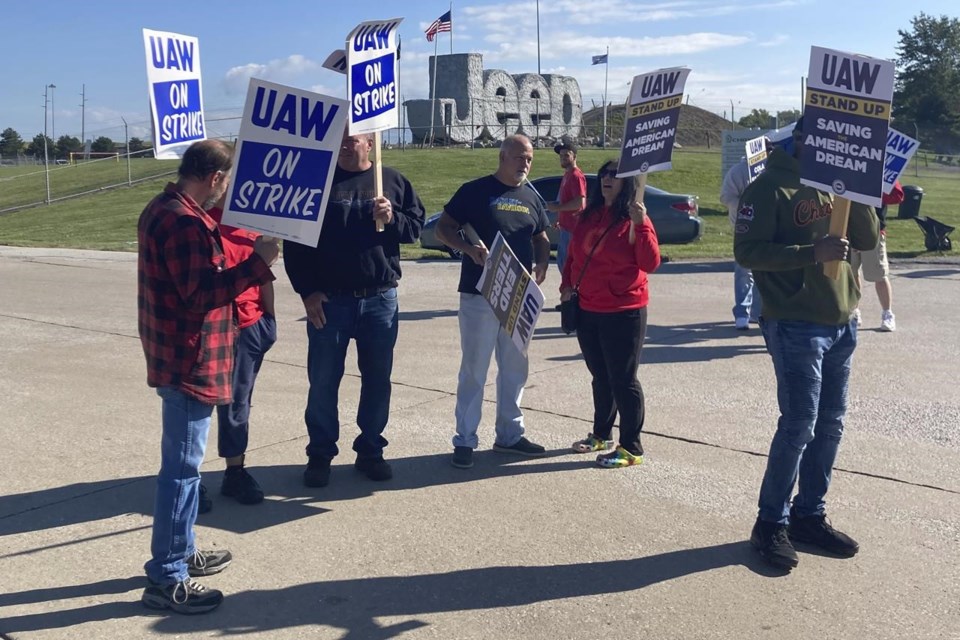TOLEDO, Ohio (AP) — When Rhonda Naus got a job inspecting Jeep Wranglers fresh off the assembly line, her paycheck added up to roughly half of what her co-workers were making. But with that came an expectation that her temporary status eventually would become permanent with a big jump in wages.
Six years later, she's still doing the same work as her colleagues at Stellantis and still making a lot less.
“I knew I had to start at the bottom. I didn’t think I’d be at the bottom forever," said Naus, who's among thousands of striking United Auto Workers nationwide pushing for pay and benefit increases along with an end to multiple tiers of wages for workers across the companies.
From office workers to delivery drivers, companies have become increasingly reliant on temporary workers. Automakers have used the lower-paid workers for years to fill in for absent and vacationing full-time employees and to staff up when production increases.
Tiers for the Detroit automakers were created starting in 2007 as the UAW tried to help them out of serious financial troubles. Even so, GM and Chrysler ended up in government-funded bankruptcies.
Today, union leaders say the Detroit automakers are abusing the system to save money by treating temps like full-time workers — one major point of contention in current contract talks that has led to more than 25,000 auto workers going on strike.
“Temp work has to be temporary work," said UAW President Shawn Fain weeks before the strike began. "We’re going to end the abuse of temps.”
The union is also asking for pay raises as part of the contract talks, as well as a 32-hour week with 40 hours of pay, the restoration of traditional defined-benefit pensions for new hires and a return of cost-of-living pay raises, among other benefits.
Under contracts negotiated in 2019, temporary workers reach full-time status at GM after 19 months of continuous employment and at Ford after two years. At Stellantis, maker of Jeeps, Rams and Chryslers, they get preferential hiring but no guarantees.
In the current negotiations, GM and Stellantis have made offers to increase temporary worker starting pay from $16.67 to about $20 per hour. Ford raised its offer to $21 per hour with profit sharing and said it would make temporaries full-time workers after 90 days of continuous service.
Once temporary workers become full time, they start on a higher pay scale that eventually would reach the top assembly plant wage of $32 per hour.
Of the Detroit Three, Stellantis relies most heavily on temporary employees, who make up about 12% of its UAW workforce, or just over 5,100 employees. GM said its temporary workforce accounts for between 5-10% of its total union members while Ford is at about 3%.
Temps — also known as supplemental employees — account for about one in every five of the 5,800 unionized workers at the Stellantis plant that makes Jeeps.
“You can be here 10 years and still not be full time. That’s crazy,” said Logan Bohn, of Woodhaven, Michigan, who has worked at the plant in Toledo for two years.
Starting pay for Stellantis temporary workers is $15.78 per hour — less than some fast food restaurants — and caps out at $19.28 after four years.
Neither Ford nor GM would comment on Fain's assertion that the companies are paying poverty wages to temps. A Stellantis spokeswoman noted that the company has said it wants an agreement “that fairly rewards our workforce for their contribution to our success, without significantly disadvantaging Stellantis against our nonunion competitors.”
The UAW's effort to eliminate tier wages was emboldened this summer when UPS agreed to end the system for its drivers in a new contract with the Teamsters.
Along the picket lines outside the auto plants, even workers who wouldn't directly benefit from ending the tier-wage system say it's a top issue for them. Jennifer Navarre, a full-timer on the Jeep assembly line in Toledo, Ohio, said it's an unfair arrangement.
“We have to fight together,” she said.
It's not just the wages that are unequal for temporary workers. They have less health care benefits and don't get profit sharing checks or other performance bonuses. They also must deal with unpredictable schedules and can be told to work overtime when others are allowed to go home.
“Some weeks you’re working six or seven days, then a few weeks later, it’s boom, ‘We don’t need you here’ or ‘We only need you on Monday,’” Naus said.
Workers in Toledo say there's high turnover among temporary workers and that many left when Amazon opened a nearby distribution center and after a solar panel plant expanded its operations.
Orlando Evans, hired in by Jeep five years ago, said many temps who've stayed work second jobs with flexible hours because they never know when they'll be asked to work six days a week or none at all. He started a business driving people to the airport and around town.
“The idea came on after all the times I’d been sent home,” he said. Evans hasn't left the temporary job with the automaker because he needs health care coverage for his three children and two step kids.
“Outside of that, there’s not too much more reason to stay,” he said.
Courtney Torres, who has four children at home, said she lives paycheck to paycheck while working six days a week.
“I just get health care and hope,” she said.
The hope, she said, is that the new contract will give her and the others a direct route to full-time employment.
“I want a career, I want to be some place, I want to be able to take a vacation, take my kids on vacation," she said. “Honestly, if they don’t give us a clear path, I don’t plan on staying. I’m struggling to keep up.”
___
Krisher reported from Detroit.
John Seewer And Tom Krisher, The Associated Press


